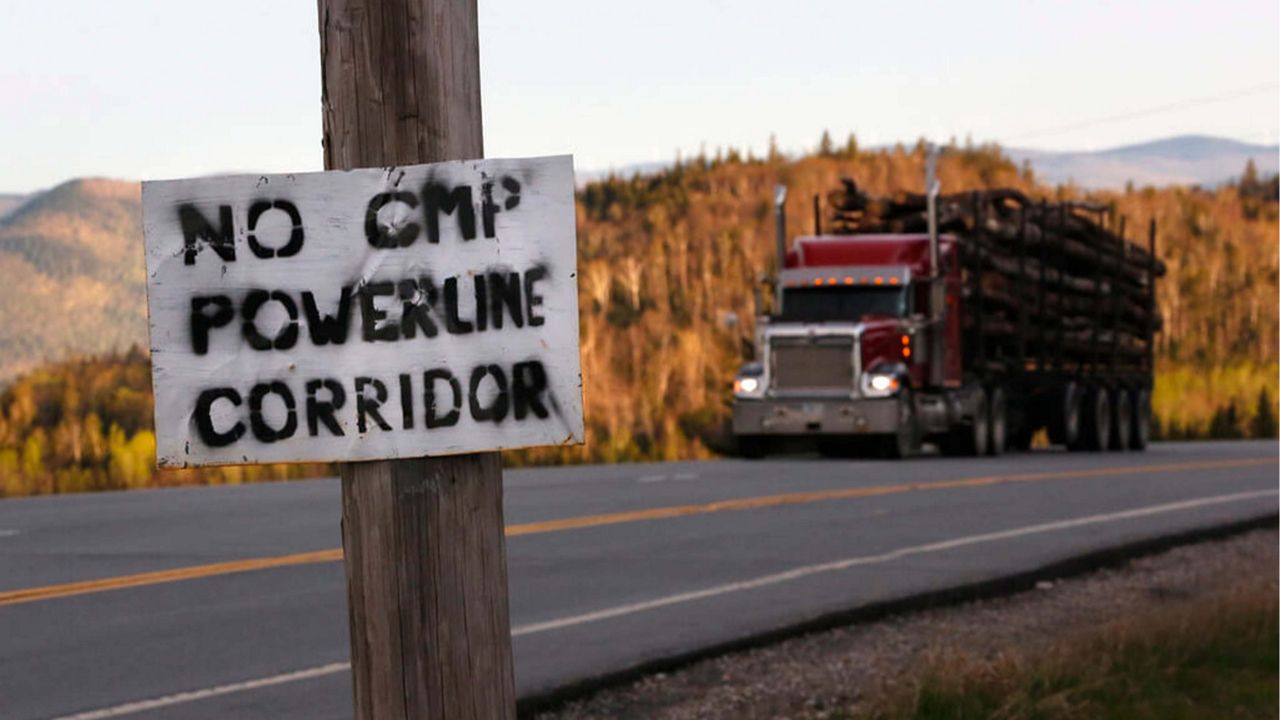Central Maine Power and the state laid out arguments in court Wednesday on whether a voter-approved law seeking to block the utility’s controversial transmission line should take effect Sunday, or whether construction on the project should be allowed to resume.
District Court Judge Michael Duddy said at the virtual hearing that he expects to rule by the end of the week on CMP’s request for a preliminary injunction against the enforcement of that law. Without the injunction, the utility argues, the project could fail altogether.
The law, set to take effect Sunday, comes from a ballot initiative approved by Maine voters in November. It would ban high-voltage transmission lines from the region where the CMP corridor is being built, and require more legislative approval for similar projects in the future.
Debate over the injunction centered on whether the utility and its owner Avangrid have attained what are called “vested rights” to move forward, or to what extent they assumed the risk that the project could stall when they started construction with various legal issues still unresolved.
“There’s going to be risks the developer takes on, but it knows those risks when it starts the project,” Avangrid attorney John Aromando said. “What it doesn’t know is that, several years into the project, after commencement and completion of substantial construction pursuant to those valid permits, the rules are going to change. … Those risks cannot be put on the developer once rights have vested.”
Defending the Maine agencies named in the suit, assistant attorney general Jonathan Bolton argued that the corridor — formally called New England Clean Energy Connect, or NECEC — has not earned the right to proceed.
“You also have to show that the retroactive legislation that affects that property interest doesn't further a legitimate legislative purpose by rational needs, or is arbitrary and capricious,” Bolton said. “Even if the court believes that NECEC has established a likelihood that they have acquired vested rights, the court should rule that that is insufficient to actually establish a due process constitutional claim, which I believe is what they need to do.”
Bolton also disagreed with Avangrid and its supporters’ contention that the referendum was overly targeted at the CMP corridor alone.
The state is in a complex position in this case, where it must defend a law approved by voters through the referendum process and certified by the Secretary of State. In another ongoing appeal, set to reach the state Supreme Court in the new year, the state is arguing against corridor opponents who’ve challenged the project’s state-issued public lands lease.
CMP agreed to stop construction after the referendum passed, but wouldn’t commit to that pause beyond awaiting a result from Wednesday’s hearing. CMP’s attorney said the utility has already finished about 90% of the tree-clearing that’s been a focus for project opponents.
Aromando, the Avangrid attorney, said the work on poles and wires that the referendum would block poses a financial threat to the project, not an environmental threat to the state.
“The costs of having a significant delay in construction, added on to the existing expense, will make (it so) the project won't be able to support its own weight,” he said. “If this injunction is not granted, and there is an interruption of construction for even a few months, there's a likelihood the project will fail and that's irreparable harm.”
The Natural Resources Council of Maine, a leading corridor opponent, argued the project still threatens the state’s environment even with the clear-cutting phase mostly done.
“There is more cutting you need to do. They need to bring in heavy equipment and big heavy towers that they have to put in the ground,” the nonprofit’s attorney Jamie Kilbreth said. “And there's harm to the people of Maine, whose will will be ignored and overturned.”
Kilbreth argued CMP wants the injunction so it can push ahead on “wildly unrealistic” schedules it set to finish the project by the end of 2023, hoping to meet the deadline on its contract with Massachusetts, which is funding the project in order to claim its climate change benefits.
Maine lawmakers have asked Massachusetts to pick a different project to fill that goal. Three years ago, Massachusetts tapped CMP when New Hampshire rejected a similar project, Eversource’s Northern Pass transmission proposal. Massachusetts made that switch even with court challenges around Northern Pass still pending in New Hampshire.
Along with NRCM, other intervenors on both sides of the case made arguments at Wednesday’s hearing. The environmental group was joined by NextEra, a Florida-based energy company that owns fossil fuel and renewable assets in Maine and would compete with the hydropower the corridor would bring into New England. It furthers the strange bedfellows this saga has created.
Backing Avangrid were the state Chamber of Commerce; Cianbro, a contractor working on the project; Hydro-Quebec, which would supply the power to the transmission line; and the Industrial Energy Consumer Group (IECG), a collective of energy-intensive Maine businesses.
“IECG’s members and anyone interested in pursuing infrastructure projects in Maine depend on the integrity and finality of our regulatory and judicial processes,” IECG attorney Sigmund Schutz said. “Retroactive application of the initiative to this project would be a big and possibly irreversible step backwards in the state's efforts to fight climate change… (and) would be a flashing red light to developers of any big projects in this state in the future.”
Regardless of the outcome this week in the injunction phase of the case, more litigation is expected in the coming months on CMP’s larger constitutional challenge to the referendum and other open appeals to the project’s permits.



